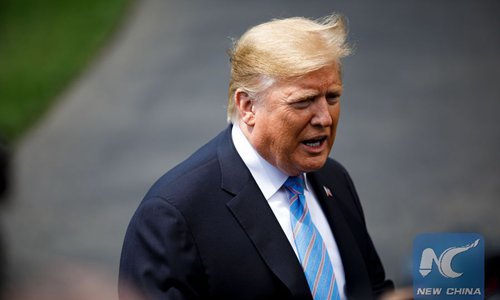HOME >> WORLD
US to deploy additional troops to Middle East as tension grows
Source:Xinhua Published: 2019/6/19 9:20:15

File Photo: US President Donald Trump speaks to reporters before leaving the White House in Washington D.C., the United States, on May 14, 2019. (Photo: Xinhua)
The United States will deploy about 1,000 additional troops to the Middle East, where tensions are rising, acting US Defense Secretary Patrick Shanahan announced on Monday.
"I have authorized approximately 1,000 additional troops for defensive purposes to address air, naval, and ground-based threats in the Middle East," Shanahan said in a statement.
The acting Pentagon chief noted that the latest deployment was requested by the US Central Command (CENTCOM), and at the advice of the chairman of the Joint Chiefs of Staff as well as in consultation with the White House.
The deployment came days after attacks on two oil tankers in the Gulf of Oman. The Trump administration has accused Iran of being responsible for the attacks, which Tehran has denied.
Shanahan also pointed out that the decision to go ahead with the reinforcement resulted from "hostile behavior" by Iranian forces, which "threatens US personnel and interests across the region."
The Pentagon over the weekend accused Iran of attempting to shoot down a US military drone as it was flying over one of two crippled tankers.
Also on Monday, US State Department spokesperson Morgan Ortagus announced at a press briefing that Secretary of State Mike Pompeo would visit CENTCOM and US Special Operations Command in Florida on Tuesday to discuss regional security and ongoing operations with senior military officials.
The ongoing tensions in the Middle East were further overshadowed by Tehran's announcement of disregarding its obligation under the 2015 Iran nuclear deal, known as the Joint Comprehensive Plan of Action (JCPOA).
The Atomic Energy Organization of Iran (AEOI) announced on Monday that Tehran would exceed limits on its low-grade uranium enrichment stockpiles by June 27.
Under the JCPOA, Iran accepted to stockpile low-grade enriched uranium by 300 kg.
Behrooz Kamalvandi, spokesman for the AEOI, said that Iran might also increase uranium enrichment to up to 20 percent of purity for use in the Tehran Research Reactor.
Iran's "nuclear blackmail must be met with increased international pressure," US National Security Council Spokesman Garrett Marquis said on Monday.
President Donald Trump pulled Washington out of the nuclear deal in May last year and resumed energy and financial sanctions on the Islamic Republic.
"The current crisis with Iran is yet another example of Trump's coming up with a solution (withdrawal from a flawed but still functional JCPOA) to a problem we didn't have and making that problem worse in the process," Aaron David Miller, a Middle East expert from the Washington-based think tank Wilson Center, tweeted.
Washington and Tehran have been locked in a war of words over the past weeks amid escalating tensions that had been stoked following the United States' military buildup in the Middle East.
In early May, the United States deployed the Abraham Lincoln aircraft carrier group, bombers, the amphibious transport dock and Patriot air defense system to the region.
The Pentagon later announced it would send to the Middle East 1,500 US troops along with Patriot air defense systems, drones and fighter jets, a move Shanahan called a "prudent response to credible threats from Iran."
Iran has vowed to withstand the US "bullying policies."
Despite the fact that the Trump administration has repeatedly claimed the United States does not seek conflict with Iran and the military deployment only serves as a deterrence, analysts are still worried that unintended incidents and miscalculations between Washington and Tehran might ultimately trigger military conflicts.
Even if neither side wants to fight, miscalculations, missed signals and the logic of escalation could conspire to turn even a minor clash into a regional conflagration, Ilan Goldenberg, a Middle East expert at the Center for a New American Security, wrote recently in a piece for Foreign Affairs magazine.
RELATED ARTICLES:
Posted in: AMERICAS